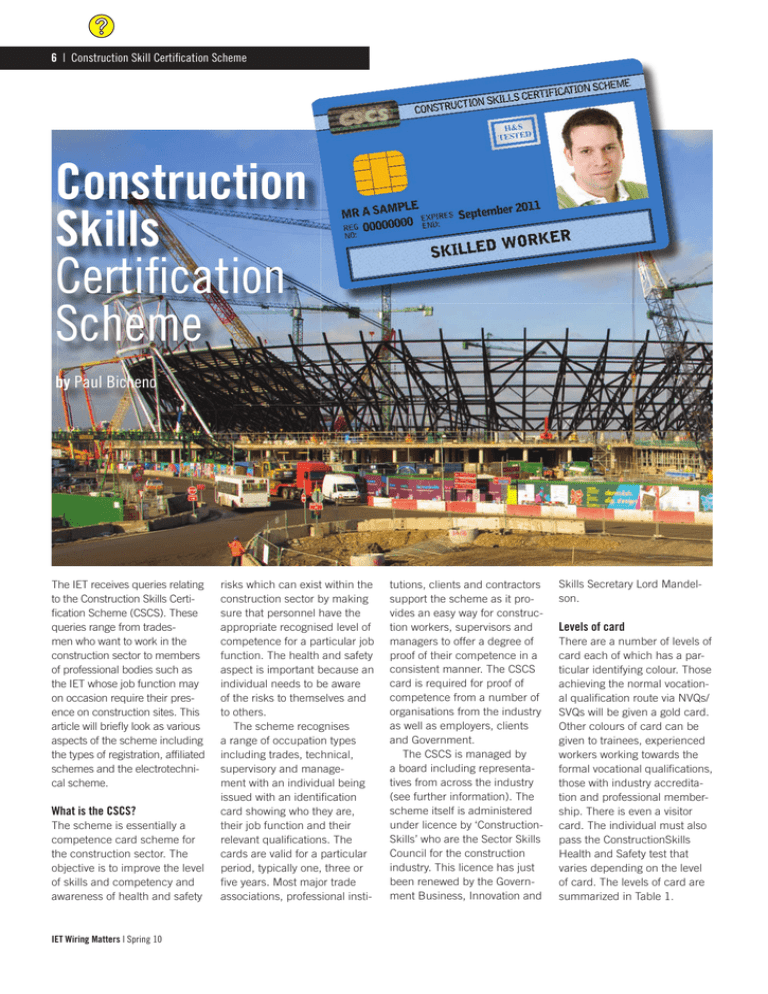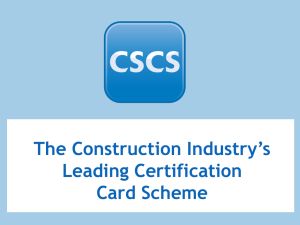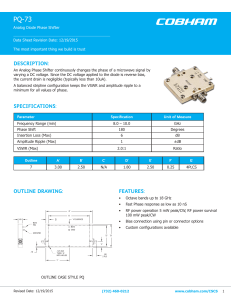Construction skills certification scheme
advertisement

6 | Construction XXXXXXXXXXXXXXXXXX Skill Certification Scheme Construction Skills Certification Scheme by Paul Bicheno The IET receives queries relating to the Construction Skills Certification Scheme (CSCS). These queries range from tradesmen who want to work in the construction sector to members of professional bodies such as the IET whose job function may on occasion require their presence on construction sites. This article will briefly look as various aspects of the scheme including the types of registration, affiliated schemes and the electrotechnical scheme. What is the CSCS? The scheme is essentially a competence card scheme for the construction sector. The objective is to improve the level of skills and competency and awareness of health and safety IET Wiring Matters | Spring 10 risks which can exist within the construction sector by making sure that personnel have the appropriate recognised level of competence for a particular job function. The health and safety aspect is important because an individual needs to be aware of the risks to themselves and to others. The scheme recognises a range of occupation types including trades, technical, supervisory and management with an individual being issued with an identification card showing who they are, their job function and their relevant qualifications. The cards are valid for a particular period, typically one, three or five years. Most major trade associations, professional insti- tutions, clients and contractors support the scheme as it provides an easy way for construction workers, supervisors and managers to offer a degree of proof of their competence in a consistent manner. The CSCS card is required for proof of competence from a number of organisations from the industry as well as employers, clients and Government. The CSCS is managed by a board including representatives from across the industry (see further information). The scheme itself is administered under licence by ‘ConstructionSkills’ who are the Sector Skills Council for the construction industry. This licence has just been renewed by the Government Business, Innovation and Skills Secretary Lord Mandelson. Levels of card There are a number of levels of card each of which has a particular identifying colour. Those achieving the normal vocational qualification route via NVQs/ SVQs will be given a gold card. Other colours of card can be given to trainees, experienced workers working towards the formal vocational qualifications, those with industry accreditation and professional membership. There is even a visitor card. The individual must also pass the ConstructionSkills Health and Safety test that varies depending on the level of card. The levels of card are summarized in Table 1. Construction Skill XXXXXXXXXXXXXXXXXX Certification Scheme | 7 Level Table 1 – Summary of Levels of CSCS card Trainee / Graduate Colour Red More data can be stored electronically for use in applications like attendance monitoring, occupational health restrictions and cashless vending. Updating of the data will be easier if someone needs to amend personal details or record additional training that has been completed. Affiliated and amalgamated schemes There are a number of affiliated or amalgamated schemes covering many specific occupations. These schemes are based on the same standards as CSCS and require the holder to gain the appropriate vocational qualification and pass the Health and Safety test. These schemes are summarized in Table 2 – CSCS affiliated and amalgamated schemes. This card is for; L craft trainees working towards an appropriate vocational qualification CSCS ‘SmartCard’ From January 2010, ‘SmartCards’ will be issued to replace the existing format of CSCS cards, however current cards will still be valid until their expiry date. The new card is similar to a chip and pin type card where the related information about an individual is stored electronically and will be read by dedicated SmartCard hand held or PC based readers. This type of card will make it harder to produce counterfeit cards as they will be easily detected via the card readers because the details and identity of an individual can be checked automatically at point of entry every time rather than via a traditional manual query to the CSCS administration. Occupation L trainees in technical, supervisory and management oc- cupations registered on a construction related qualification in a further/higher establishment L graduates with a recognised construction related qualification Construction Site Operative Green Experienced Worker Blue This card is for persons who would have occupations with basic skills e.g. Labourer. This card is for; L persons that are workers who have on-the-job experience but have not been accredited. They would be looking to gain the appropriate qualification L persons that are technicians, supervisors or managers who have on-the-job experience and whose occupation has industry accreditation or registering to gain the appropriate vocational qualification Skilled Worker Blue This card is for a skilled person who has achieved the appropriate vocational qualification or has completed an employer sponsored apprenticeship and completed a City and Guilds craft certificate. Advanced Craft / Supervisory Gold This card is for; L persons that have a higher level of vocational qualification or has completed an indentured apprenticeship or has completed an employer sponsored apprenticeship and completed a City and Guilds advanced craft certificate L persons who are in supervisor occupations and have a higher level of vocational qualification. Management Platinum Management Black This is for managerial occupations and requires a high level of vocational qualification. Professionally Qualified Person Yellow This is for non-site based professionals who would have relevant responsibilities such as Consultants, Client Architects and Surveyors. Regular Visitor Yellow This is for people who do not have any construction specific skills but are regular visitors to a site. They will still need to pass the H&S test. Construction Related Occupation White This is for construction related occupations that are not covered by the other card categories. This card has been withdrawn from the scheme on 1st January 2010. (applications are now for a Black card) Note: Some routes to gaining a card enabled an applicant to specifically use their experience as evidence known as ‘industry accreditation’; however the majority of these routes are now closed. Spring 10 | IET Wiring Matters 8 | Construction XXXXXXXXXXXXXXXXXX Skill Certification Scheme Scheme Name Assuring Competence in Engineering Construction (ACE) Certificate of Competence of Demolition Operatives (CCDO) Occupation UK Engineering construction workers Demolition operatives Construction Industry Scaffold- Scaffolders ers Record Scheme (CISRS) Construction Plant Competence Plant operators Scheme (CPCS) Construction Skills Register (CSR) The Northern Ireland equivalent to CSCS Electrotechnical Certification Scheme (ECS) various electrotechnical e.g. Installation Electrician, Building Controls Engineer Energy and Utility Skills Register (EUSR) Utility industry scheme including, Electricity, gas and water industry workers Join Industry Board for Plumbing and Mechanical Services (JIB-PMES) Engineering Services Skillcard (SKILLcard) Scottish and Northern Irish Joint Industry Board (SNIJIB) Plumbers (in England and Wales) Heating, ventilating, air conditioning and refrigeration operatives Plumbers (in Scotland and Northern Ireland) Table 2 – CSCS affiliated and amalgamated schemes Electrotechnical certification scheme One of the affiliated schemes is the Electrotechnical Certifiaction Scheme (ECS). This is recognised by industry as the electrotechnical equivalent to the CSCS. The ECS is administered by the Joint Industry Board (England, Wales and Northern Ireland) and the Scottish Joint Industry Board (Scotland), the Electrical Contractors Association and SELECT. The Scheme enables all occupational levels of electrotechnical personnel to have their own card e.g. trainees to managers. Occupations are included for the following IET Wiring Matters | Spring 10 areas; L Electrical, Electronic and Management L Datacomms L Emergency and Security systems L Fire Detection and Alarm systems As an example, to be eligible for an ECS Installation Electrician card, applicants must meet the following criteria: L have successfully completed an Approved Apprenticeship – or – Lhold the City and Guilds 2360 Part One and Two, or City and Guilds 2351 or City and Guilds 2330 Levels 2 and 3 or Approved Equivalent – plus – LNVQ Level 3 in Installation and Commissioning – and – L hold a current (up-to-date) Health & Safety Certificate or recognized H&S qualification – and – L hold a formal BS 7671 qualification in the current edition of the wiring regulations (currently BS 7671: 2008, 17th Edition) Members of Professional Institutions As already highlighted, the Professionally Qualified Person card is for individuals who are members of an approved institution (see further information for a link to a list). The individual’s competence would be assessed against the relevant institutions requirements. As a Gold or Platinum card holder of the Electrotechnical Scheme, the JIB is working in collaboration with the IET to enable an individual to gain membership and pursue their professional development with the aim of raising the level of professionalism. From the 1st April the PQP card criteria will be changing. Members of the listed 10 | Construction XXXXXXXXXXXXXXXXXX Skill Certification Scheme Affiliated and amalgamated schemes: Assuring Competence in Engineering Construction (ACE) www.ecitb.org.uk Certificate of Competence of Demolition Operatives (CCDO) http://www.ndtg.org/card_ scheme Construction Industry Scaffolders Record Scheme (CISRS) http://www.cisrs.org.uk/ Construction Plant Competence Scheme (CPCS) http://www.cskills.org/cpcs Construction Skills Register (CSR) http://www.cefni.co.uk/ Electrotechnical Certification Scheme (ECS) http://www.jib.org.uk/ecs1.htm http://www.ecscard.org.uk/ Energy and Utility Skills Register (EUSR) http://www.eusr.co.uk/ Join Industry Board for Plumbing and Mechanical Services (JIB-PMES http://www.jib-pmes.org.uk/ Engineering Services Skillcard (SKILLcard) http://www.skillcard.org.uk/ Scottish and Northern Irish Joint Industry Board (SNIJIB) http://www.snijib.org/ IET Wiring Matters | Spring 10 professional organisations will be assessed against the competency criteria of their respective professional organisation with the non site based criteria being dropped. This is being introduced to make the scheme simpler. There is a briefing session planned that is aimed at members of the professional organisations to talk about the changes to the scheme on the 25th March 2010 at The Royal Institute of British Architects (RIBA) HQ in London. Persons interested in attending should do so via email (feedback@cscs.gb.com). Further information L More information on the CSCS is available from the following site: www.cscs.uk.com L A list of approved institutions is available from the following link: http://www.cscs.uk.com/ professions L More information on Con- structionSkills is available from: http://www.cskills.org/. L Health and safety test prepa- ration material is available from the following site: http://www. healthandsafetytest.co.uk/ Construction Confederation www.thecc.org.uk Federation of Master Builders www.fmb.org.uk GMB Union www.gmb.org.uk National Specialist Contractors Council www.nscc.bbsnet.co.uk T&G Section of UNITE (Building Crafts Section) www.unitetheunion.com Union of Construction, Allied Trades and Technicians www.ucatt.info


